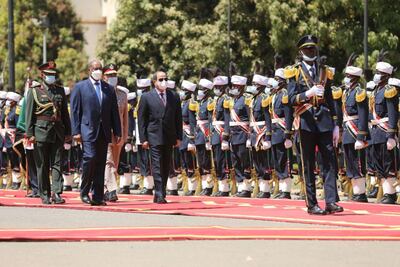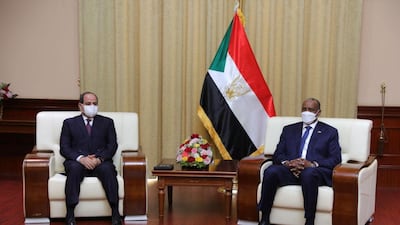Egypt and Sudan reject Ethiopia’s “attempts” to control the Blue Nile, the river’s main tributary, and will both suffer “grave damage” if the Horn of Africa nation goes ahead with a second filling of a massive Nile dam it is building before an agreement is reached on its operation, Egypt’s president said on Saturday.
Abdel Fattah El Sisi also told a news conference at the end of a lightning visit to Khartoum that he and Sudanese leaders wanted to see negotiations with Ethiopia over the dam restarted before the Nile's annual flood in the summer, when Addis Ababa said it intended to do the second filling with about 13 billion cubic metres.
Mr El Sisi also reiterated Egypt's support for Sudan in its border dispute with Ethiopia, saying it had a legitimate right to defend its territory under internationally recognised agreements.
Mr El Sisi's visit to Sudan was his first since the removal of longtime dictator Omar Al Bashir from power in 2019.
The visit took on added significance because of the ongoing tension on the Sudanese-Ethiopian border and the dangerous stand-off over the Grand Ethiopian Renaissance Dam, or Gerd.
Mr El Sisi was greeted in Khartoum with tight security measures, with several of Khartoum's main boulevards closed to traffic during his brief stay in the Sudanese capital.
His talks with the Sudanese leader took place in the Blue Nile-side presidential palace after which he left for the airport to fly home late in the afternoon.
“This visit is a genuine show of support to Sudan,” Gen Abdel Fattah Al Burhan, Sudan’s de facto head of state, told the news conference.
"It's a real act of support to Sudan and its revolution," he said, alluding to the months of street protests against Al Bashir's 29-year rule that paved the way for his removal in April 2019 and the creation five months later of a transitional military-civilian government.
A series of deadly border clashes between Ethiopian and Sudanese forces have taken place since Sudan’s military moved late last year to wrest back control of farmlands long settled by members of Ethiopia’s Amhara ethnic group.

The two countries have claimed border breaches by the other and of massing troops in the region, heightening tensions and raising the prospect of a border war.
Sudan and Egypt have, meanwhile, increased their military co-operation in recent months, conducting joint war games and exchanging high-level visits by their top brass.
The two neighbours signed a military co-operation agreement on March 4, with Cairo saying it was prepared to rush to Sudan’s aid if needed.
Ethiopia says it will not negotiate over its border dispute with Sudan before Sudanese troops are pulled from the areas they have retaken, a condition Khartoum has rejected.
Sudan also maintains that the border was demarcated in a 1902 agreement between the two nations that was reaffirmed in 1972.
“Our views are identical in that we reject any approach aimed at imposing a de facto situation and take control of the Blue Nile through unilateral actions that pay no heed to the interests and rights of the two downstream nations [Egypt and Sudan],” the Egyptian leader said of Ethiopia’s declared intention to press ahead with the filling.
The Blue Nile’s source is on the Ethiopian Highlands, from which it thunders down to eastern Sudan before it meets the White Nile in Khartoum.
Together, the two rivers form the Nile, which travels north through Sudan and Egypt all the way to the Mediterranean. The Blue Nile accounts for more than 80 per cent of the Nile’s water.
“We have emphasised the need to return to serious and effective negotiations as soon as possible and before the start of the flood season to reach a just, balanced and legally-binding agreement on operating and filling the dam,” said the Egyptian leader.
Negotiations between Egypt, Sudan and Ethiopia on the GERD have broken down after years of fruitless attempts at striking a deal.
Egypt and Sudan want Ethiopia to agree to mechanisms on how to deal with future droughts and resolve disputes.
Addis Ababa has baulked at that request, saying it prefers to agree to non-binding guidelines for operating the dam, Africa’s largest that will generate 6,000 megawatts.
Sudan wants Ethiopia to share data on the operation of the dam, built less than 20 kilometres from its border, to avoid possible flooding or the disruption of its much smaller, power-generating dams on the Blue Nile.
Egypt, on the other hand, fears that the dam would deeply cut in its vital share of the Nile waters, wiping out hundreds of thousands of jobs and disrupting its delicate food balance.
Egypt and Sudan have recently demanded that a quartet made up of the African Union, EU, the US and UN should join the negotiations on the Gerd. Mr El Sisi repeated that request on Saturday.
Ethiopia has yet to comment on the creation of a quartet to join the negotiations.


